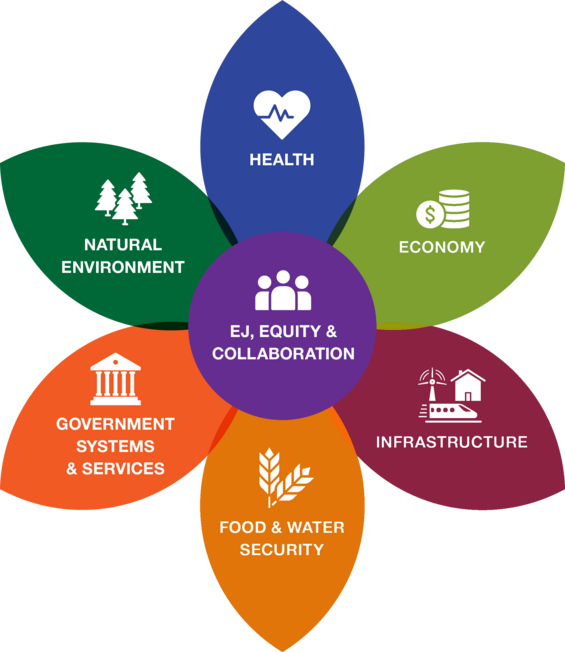Read the Report
What is ResilientMass?
ResilientMass is Massachusetts' statewide commitment to reducing risks and building resilience to natural hazards and the local impacts of climate change. It brings together all our state's planning, programs, and partnerships focused on climate adaptation and resilience.
Through this initiative, EEA and MEMA are taking a "whole-of-government" approach. This means we're all working together to create ways to measure our progress on the ResilientMass Plan. These measurements will help us guide our strategies for climate resilience funding and action across the Commonwealth.
What do the Metrics Measure?
These metrics will help us assess how we're building climate resilience in four key areas: our environment, our communities, our buildings and infrastructure, and our economy. We're especially focused on making sure we advance environmental justice and equity throughout this process, so that everyone benefits and no one is left behind.
The metrics directly connect the important impacts identified in our 2022 Climate Change Assessment and the 2023 ResilientMass Plan to the specific actions we're taking to reduce those impacts. By using these metrics, EEA and the inter-agency ResilientMass Action Team will be able to see how effective our state-led actions are in preparing for, responding to, and reducing the impacts of climate change.
How were the ResilientMass Metrics developed?
The ResilientMass Metrics include both process-based (what we do) and outcome-based (what we achieve) goals and measurements. We developed them by working closely with a consultant team, state agencies, community partners, subject matter experts, and the public.
Our framework is built around seven interconnected sectors, with environmental justice and equity woven throughout each one.

Understanding the Metrics Framework
- Sectors: These are groups of goals, indicators, and metrics that address similar themes related to climate resilience.
- Goals: These describe what a climate-resilient Massachusetts would look like and highlight the priority impacts we need to address.
- Indicators: These are statements that point to success or progress (e.g., "more green spaces," "decreased flood damage").
- Metrics: These are the measurable ways (numbers or trackable observations) we use to gauge our progress on an indicator.
- Environmental Justice and Other Priority Populations: This element refers to Environmental Justice Populations (as defined by MA law), people and communities disproportionately impacted by climate change, and Tribal Nations and Indigenous Peoples – ensuring our focus is equitable.
ResilientMass Metrics Dashboard (Beta)
EEA has developed an interactive dashboard providing an easy way to explore the ResilientMass metrics and track how the state is building resilience to climate change. For each sector, you can select a specific resilience goal to view a dropdown of its key strategies, progress indicators, and metrics.
This is a beta version, and more metrics will be coming soon once data is available.
Our Public Engagement
We believe that strong climate resilience is built together. That's why community input has been so important throughout this process.
Equity Advisory Group (EAG) EEA convened an Equity Advisory Group (EAG) for this project made up of individuals with diverse backgrounds, perspectives, geographies and lived experiences, all deeply involved in climate action within their own communities. This group provided invaluable input to:
- Shape the development process and public engagement for the ResilientMass Metrics.
- Strengthen the environmental justice and equity-related metrics to ensure more equitable outcomes.
- Our EAG members include:
- Name - Affiliation(s), member's municipality of residence (region)
- atalanta Finca Luna Búho, North Berkshires (Berkshires & Hilltowns)
- Tony Beattie - Robinwood Farm, North Central Climate Change Coalition, Pepperell (Northeast)
- Valinda Chan - Eastie Mothers Out Front, East Boston (Greater Boston)
- Guillermo Creamer, Jr. - Worcester Human Rights Commission, Miyawaki Forest Project, Worcester (Central Region)
- David Lowry - Lumbee Tribe of North Carolina, University of Southern Maine, Heller School at Brandeis University, Cambridge (Greater Boston)
- Rusty Polsgrove - Arise Springfield, Springfield (Greater Connecticut River Valley)
- Jason Steiding - Mashpee Wampanoag Tribe, Cape Cod (Southeast)
- Francelis Morillo Suarez - Metropolitan Area Planning Council, Lawrence (Northeast)
- Joy Yakie - Acadia Center, Jamaica Plain (Greater Boston)
- (Note: Members participated in their individual capacities, not as representatives of their organizations.)
Public Meetings We held two public meetings to share information and gather your valuable feedback on the draft metrics:
- May 30, 2024: Participants discussed what a climate-resilient future could look like across different sectors and how to ensure climate resilience efforts are advanced equitably in Massachusetts.
- October 15, 2024: Participants reviewed the proposed framework and shared their thoughts on the draft metrics prioritized by sector.
We want to thank everyone who participated in developing these statewide metrics for climate resilience. Your support and continued commitment are crucial as we work towards a climate-resilient Commonwealth together.
Next Steps & How to Stay Informed
We are excited to announce the release of our final report, which details this entire process and presents the recommended metrics, this report offers a complete picture of our work and the important goals we've set.
These important metrics will also be a key part of our annual Climate Report Card, helping us consistently track and communicate our efforts and achievements in building a resilient Massachusetts.
Learn More About State-Led Climate Resilience Action
ResilientMass is the Commonwealth’s overarching initiative for building statewide capacity for climate change adaptation and resilience. It provides funding, localized climate change science and data, and decision support tools to help local planners, practitioners, policymakers, and the public take action to enhance climate resilience.